Key takeaways:
- Understanding event goals is crucial for selecting speakers, as different objectives (e.g., networking, education) require different speaker types.
- Identifying the target audience helps shape speaker selection by considering demographics, interests, and previous experiences.
- Researching speaker qualifications should include assessing experience, style, and audience feedback to ensure a good fit for the event.
- Finalizing contracts requires careful attention to details, payment terms, and the speaker’s needs to prevent misunderstandings and ensure a smooth event experience.
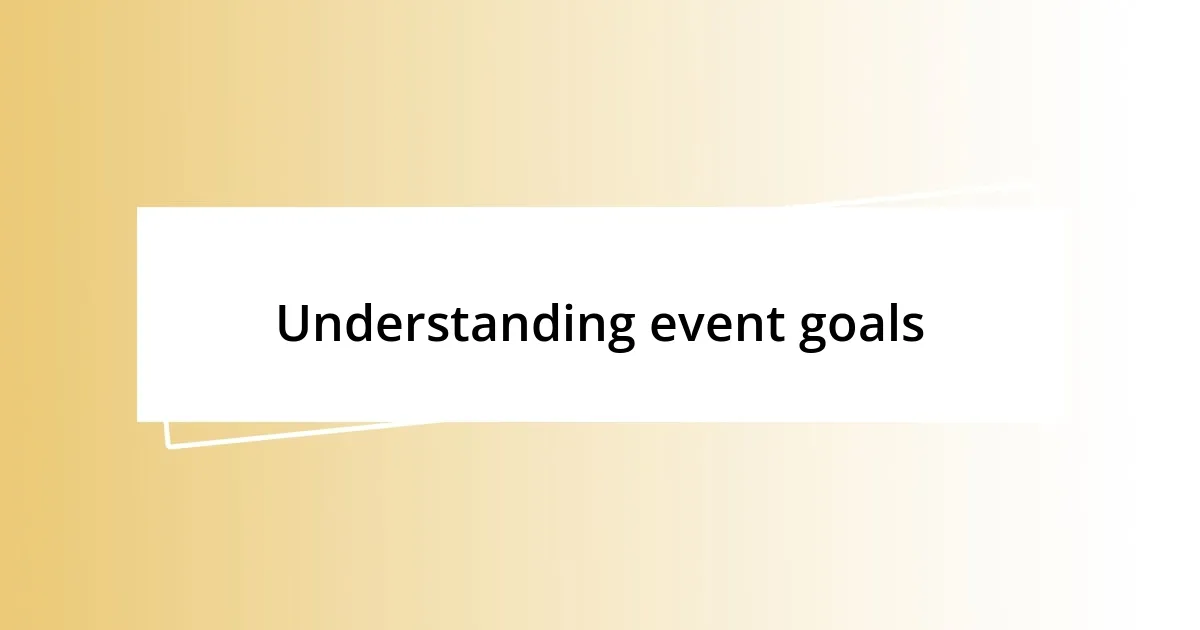
Understanding event goals
Understanding the event goals is critical in choosing the right speakers. When I think back to a conference I organized, I realized that the objectives—be it networking, education, or motivation—required a distinct type of speaker. It made me wonder, how often do we rush into selecting speakers without first painting a clear picture of what we truly want the audience to feel or learn?
Consider this: if your goal is to inspire innovation, wouldn’t you want a speaker who embodies that spirit rather than someone with a strictly academic approach? I still remember a particular workshop where the speaker’s energy and real-world examples lit a spark in attendees, clearly driving home our message of creativity. The right mindset can make all the difference in how your audience connects with the content.
When I evaluate event goals, I often ask myself what lasting impact we aim to achieve. Are we looking for actionable insights, or do we want to cultivate a sense of community? Each event has its unique flavor, and understanding these nuances elevates the entire experience—not just for the audience but for everyone involved in the planning and execution.
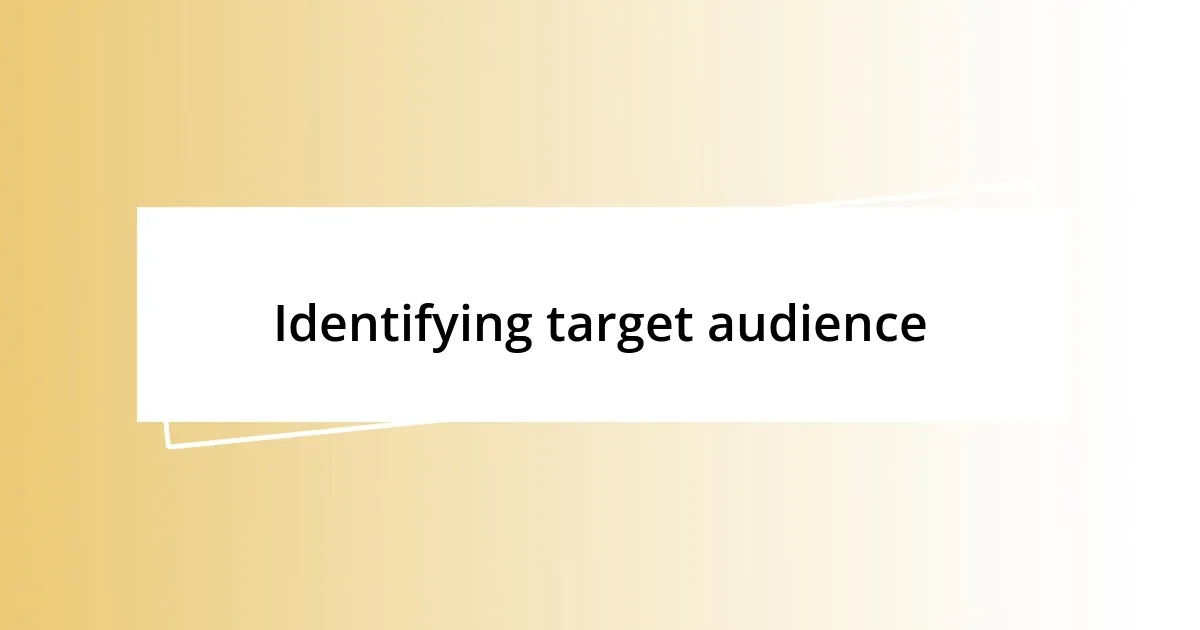
Identifying target audience
Identifying the target audience is a pivotal step that shapes the entire selection process for speakers. I recall a time when I thought I had a good grasp of my audience, only to find out later that my chosen speaker just didn’t resonate. It was a tough lesson; understanding the demographics, interests, and needs of the audience is essential. You need to pinpoint who they are and what they hope to gain from the event.
To clarify the audience profile, I find it helpful to consider these key aspects:
- Demographic Information: Age, gender, job roles, and experience levels.
- Interests and Motivations: What topics excite them? What problems are they looking to solve?
- Preferred Learning Styles: Do they favor engaging discussions, hands-on activities, or more traditional lectures?
- Previous Experiences: What speakers have they enjoyed in the past, and why?
When I apply these factors, I not only make a better choice in speakers but also create a rich, engaging environment that genuinely speaks to those attending.
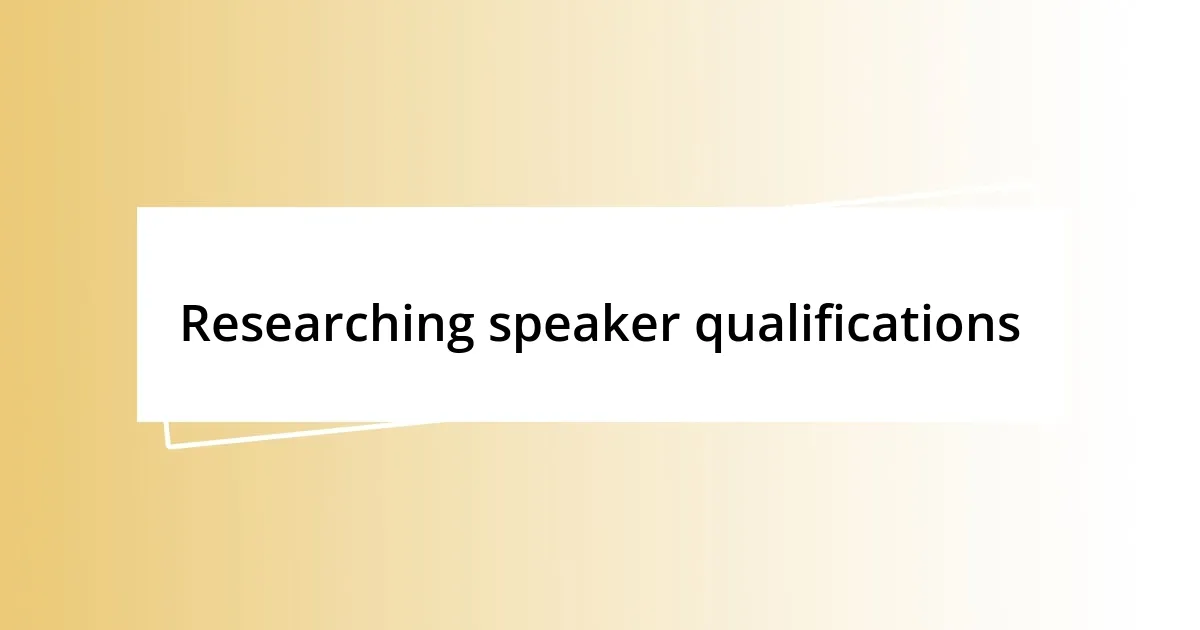
Researching speaker qualifications
Researching speaker qualifications is an essential part of the selection process. When I started looking for speakers, I learned the hard way that credentials alone aren’t enough. A great speaker should not only have relevant qualifications but also possess a unique style that connects with the audience. For example, I once overlooked a speaker who had only a couple of years of experience but who spoke passionately about their projects. Their relatable stories left a lasting impression, proving that experience can be both relative and subjective.
To dig deeper into a speaker’s qualifications, I always check their past engagements and audience feedback. It’s fascinating how much you can learn from reviews and testimonials. One time, I found a speaker who had glowing reviews but also candid critiques, such as being overly technical for some audiences. Balancing these insights helped me see not just the qualifications but the potential fit for my event. This diligence can save you from a mismatch that could otherwise derail your event.
I also utilize social media to gain insights into a potential speaker’s presence and engagement style. Their posts and interactions often reveal a lot about how they connect with various audiences. I recall a candidate whose tweets about motivational speaking resonated with me, reflecting authenticity and a genuine desire to help others. This research process isn’t just about finding someone authoritative; it’s about discovering a speaker who truly inspires and engages your audience.
| Factor | What to Look For |
|---|---|
| Experience | Years in the industry, relevant roles |
| Content Style | Engagement level, clarity, relatability |
| Audience Feedback | Reviews, testimonials, common themes |
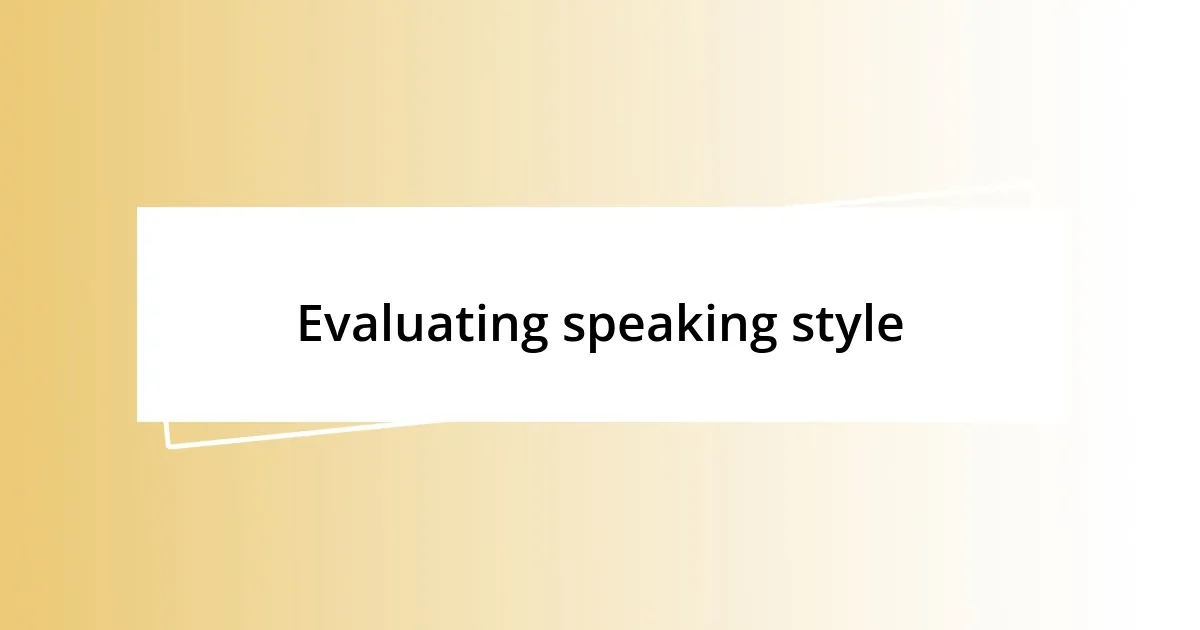
Evaluating speaking style
When evaluating a speaker’s style, I always pay close attention to their delivery and engagement techniques. I’ve found that a speaker’s energy can either uplift an audience or lead to disengagement. For instance, I once attended a presentation where the speaker’s enthusiasm was infectious; their animated storytelling made even the most complex topics feel relatable. Isn’t it fascinating how a speaker’s vibe can set the entire tone for the event?
Additionally, the use of language and visuals plays a vital role in a speaker’s effectiveness. I recall a time when a presenter used humor and vivid imagery to create memorable connections. It got me thinking: Are we simply sharing information, or are we also painting a picture that lingers in the audience’s minds? Striking the right balance between professionalism and relatability can significantly enhance audience retention and satisfaction.
I also consider how adaptable a speaker is during their presentation. Where I’ve seen some falter, I’ve found that truly skilled speakers read the room well and adjust their style accordingly. There was a moment in one of my events when a planned speech suddenly shifted into a Q&A session. The speaker navigated the change effortlessly, which not only deepened audience connection but also provided immediate value. It made me wonder: How often do we overlook the importance of flexibility in speaking style?
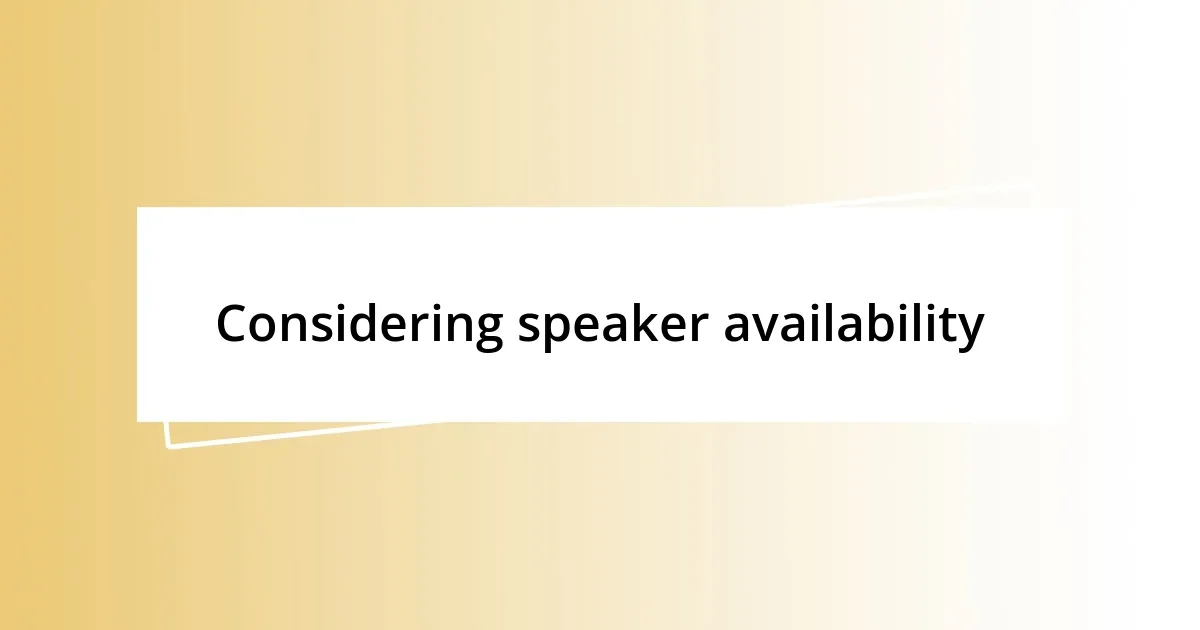
Considering speaker availability
When I’m considering speaker availability, I’ve learned the importance of planning well in advance. It’s surprising how quickly a sought-after speaker’s calendar can fill up, often months ahead of time. I remember a situation where I was eager to book a dynamic leader for an event, only to find out they were already committed elsewhere. That experience opened my eyes to the need for proactive outreach.
Beyond just checking dates, I also think about a speaker’s potential travel constraints and time zones. Once, I scheduled a virtual event and underestimated how tricky coordinating across different time zones could be. The speaker, located in Europe, had a huge time difference with our audience in the U.S., which forced us to adjust the timing last minute. This taught me to be diligent in understanding not just the available dates but also the logistical factors that can impact a speaker’s participation.
Finally, I always consider the possibility of backup options. What if the speaker I want becomes unavailable unexpectedly? During one of my events, a last-minute cancellation had me scrambling. Thankfully, I had done my research and had a few alternatives in mind. It’s a comforting feeling to have a safety net, ensuring the event can continue smoothly regardless of unforeseen changes. Have you thought about who your backup speaker would be? It might save you from undue stress in the long run.
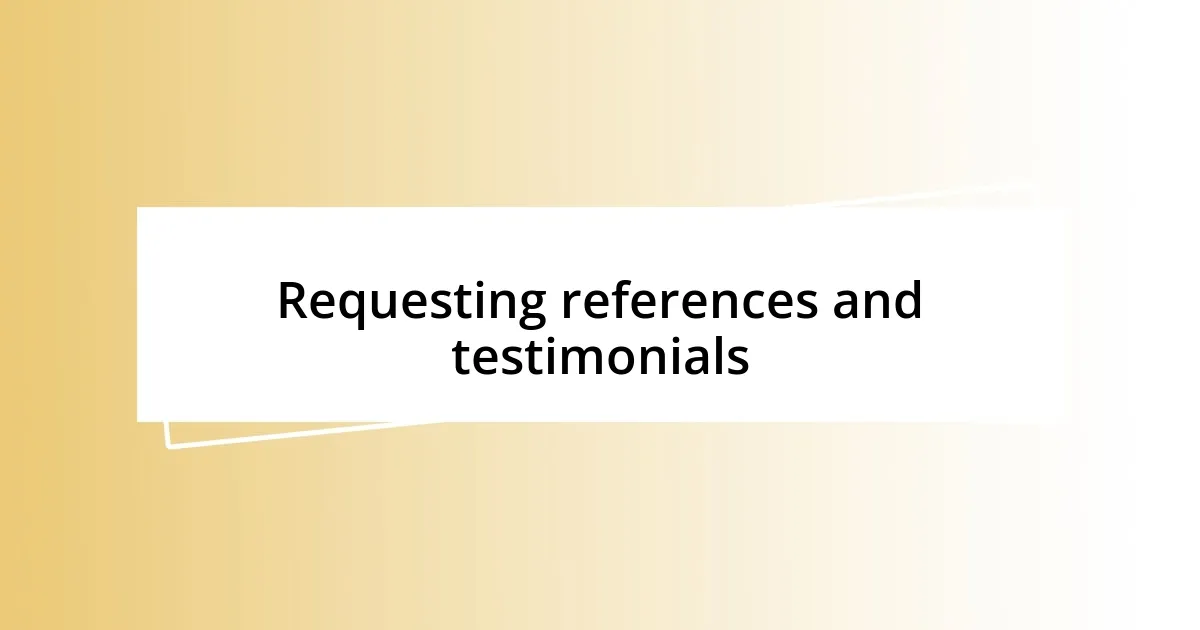
Requesting references and testimonials
When I request references and testimonials from speakers, I always look for genuine feedback that highlights their impact. I once reached out to a past event organizer who spoke highly of a speaker’s ability to engage an audience, sharing how attendees felt motivated and inspired afterward. That personal touch makes all the difference, doesn’t it? These testimonials help paint a clearer picture of what to expect.
Listening to firsthand accounts gives me invaluable insight into a speaker’s reliability and effectiveness. I remember a time when I received a glowing recommendation, but it raised one critical question for me: What specific elements made this speaker memorable? The details shared often reveal whether the speaker can truly connect with an audience or simply deliver a speech.
I also find that asking for references gives me the opportunity to gauge how well a speaker adapts to different audiences. In a previous conversation, a colleague shared how a speaker tailored their content for a specific demographic, resulting in a much stronger connection. This made me think about my own experiences: Have I always considered the audience when selecting a speaker? The answers often lie in those recommendations, guiding me to make a well-informed choice for my events.
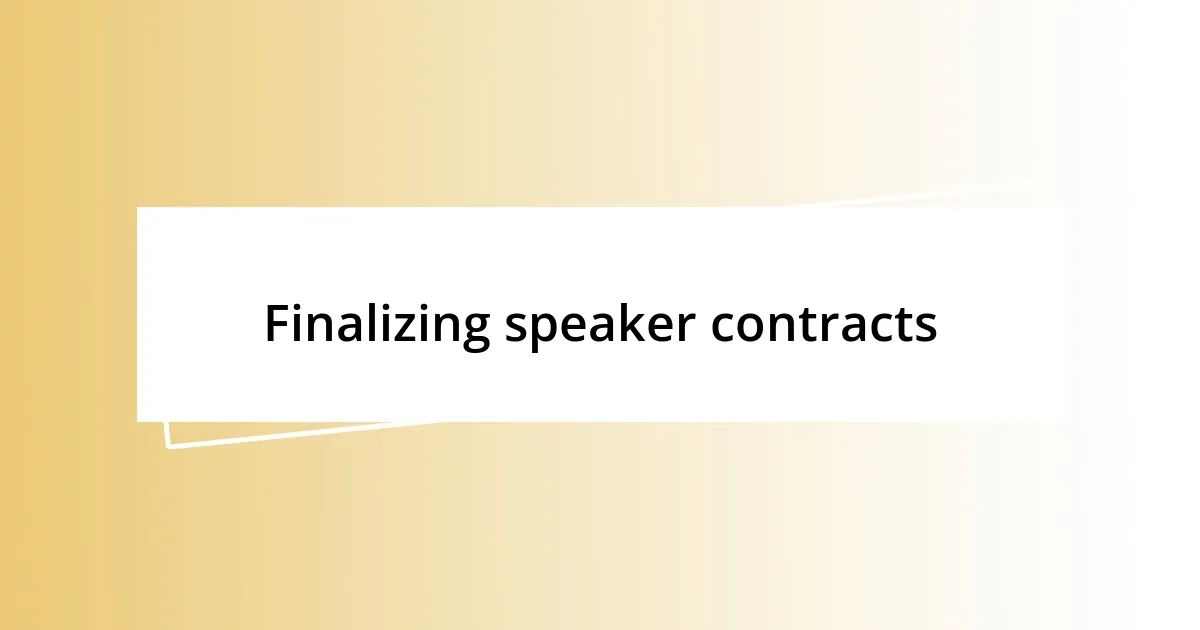
Finalizing speaker contracts
When finalizing speaker contracts, I always pay close attention to the details outlined in the agreement. I once encountered a situation where I overlooked a crucial clause about cancellation policies, which resulted in a misunderstanding later on. Have you ever assumed everything was understood, only to find out the hard way that it wasn’t? It’s a lesson I won’t forget; each stipulation deserves careful scrutiny to avoid potential pitfalls.
Payment terms are another critical aspect I focus on during this process. I’ve learned that clarity is key, especially regarding deposits and the timeline for final payments. In one memorable experience, I failed to specify a payment timeline, leading to confusion that almost jeopardized the engagement. I always ask myself whether I’m setting clear expectations; doing so can save both parties a lot of stress in the long run.
Moreover, I make it a point to discuss the speaker’s needs during this stage. I recall a time when my chosen speaker had specific technical requirements that I hadn’t anticipated. It hit me then how important it is to create an environment that allows the speaker to shine. Are we doing everything we can to support our speakers? It’s a small detail but can truly elevate the event experience for everyone involved.













